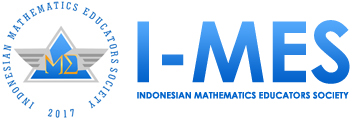The Relationship Between Self-Determination and Metacognition of Junior High School Students in Mathematics Learning Based on Gender
DOI:
https://doi.org/10.35706/sjme.v8i2.10959Abstrak
Penelitian ini merupakan penelitian quasi eksperimen yang bertujuan untuk mengetahui hubungan kemampuan metakognitif dengan determinasi diri siswa pada mata pelajaran matematika berdasarkan gender. Populasi dalam penelitian ini adalah seluruh siswa kelas VIII SMP Islam Kota Lhokseumawe dengan sampel 27 siswa. Data diperoleh dari hasil angket kemampuan determinasi diri dan angket metakognitif yang selanjutnya dilakukan pengujian korelasi spearman. Hasil korelasi kemampuan metakognitif dengan self-termination diperoleh nilai signifikansi yang menunjukkan terdapat korelasi antara kemampuan metakognitif dengan self-determination siswa dalam belajar matematika. Untuk hubungan korelasi antara kemampuan metakognitif dengan determinasi diri siswa dalam pembelajaran matematika ditinjau dari gender dengan uji korelasi spearman untuk setiap jenis kelamin diperoleh nilai korelasi untuk laki-laki (r_1) dan perempuan (r_2). Berdasarkan hasil uji beda dua rata-rata dua kelompok yang saling independen diperoleh nilai z-hitung yang menunjukkan tidak terdapat perbedaan korelasi antara kedua kelompok tersebut.
Unduhan
Referensi
Annisa, N. F., Kadir, K., & Dimyati, A. (2023). Pengembangan Instrumen Determinasi Diri Siswa Dalam Pembelajaran Matematika. Algoritma: Journal of Mathematics Education, 4(2), 149–169. https://doi.org/10.15408/ajme.v4i2.29392
Fauziana, A., Teguh Budiarto, M., Universitas Negeri Surabaya, P., & Lidah Wetan, J. (2020). Pengembangan Perangkat Pembelajaran Berbasis Realistic Mathematics Education (RME) Untuk Melatihkan Kemampuan Metakognitif. 10(2), 160–176.
Feronika, E., Simanungkalit, B., Manu, R. E. H. R., Bili, A. C. B., & Loe, A. P. (2021). Hubungan antara Motivasi dan Self-regulated Learning Siswa Selama Pembelajaran Jarak Jauh di Kota Kupang. In Haumeni Journal of Education (Vol. 1, Issue 2).
Firmasari, S., & Juandi, D. (2021). Berpikir Matematis Rigor: Kontribusi Pada Pengembangan Pengetahuan Metakognitif-Self Assessment Mahasiswa. Aksioma: Jurnal Program Studi Pendidikan Matematika, 10(2), 1222–1233. https://doi.org/10.24127/ajpm.v10i2.3430
Habibi, M., Darhim, & Turmudi. (2018). Self-Determination in Mathematics Learning Process by Using Generative Multi - Representation Learning (GMRL) Model. Journal of Physics: Conference Series, 1097(1). https://doi.org/10.1088/1742-6596/1097/1/012155
Hakan, K., & Münire, E. (2014). Academic Motivation: Gender, Domain and Grade Differences. Procedia - Social and Behavioral Sciences, 143, 708–715. https://doi.org/10.1016/j.sbspro.2014.07.469
Hidayat, Y. W., & Maharani, A. (2023). Analisis Kondisi Psikologis Siswa Dalam Pembelajaran Matematika Melalui Asesmen Diagnostik. SJME (Supremum Journal of Mathematics Education), 7(2), 169–179. https://doi.org/10.35706/sjme.v7i2.8761
Hofer, S. I., Reinhold, F., Hulaj, D., Koch, M., & Heine, J. H. (2022). What Matters for Boys Does Not Necessarily Matter for Girls: Gender-Specific Relations between Perceived Self-Determination, Engagement, and Performance in School Mathematics. Education Sciences, 12(11). https://doi.org/10.3390/educsci12110775
Hoorfar, H., & Taleb, Z. (2015). Correlation Between Mathematics Anxiety with Metacognitive Knowledge. Procedia - Social and Behavioral Sciences, 182, 737–741. https://doi.org/10.1016/j.sbspro.2015.04.822
Kanda, S. A. (2020). Mengembangkan Kemampuan Pemahaman Dan Bepfikir Kreatif Matematik Serta Motivasi Belajar Mahasiswa Melalui Penerapan Aplikasi Statistics Quick. SJME (Supremum Journal of Mathematics Education), 4(2), 188–196.
Kholid, M. N., & Kurniawan, A. A. (2022a). Defragmenting Struktur Metakognitif Siswa Dalam Menyelesaikan Masalah Hots. Aksioma: Jurnal Program Studi Pendidikan Matematika, 11(1), 80. https://doi.org/10.24127/ajpm.v11i1.4655
Kholid, M. N., & Kurniawan, A. A. (2022b). Defragmenting Struktur Metakognitif Siswa Dalam Menyelesaikan Masalah Hots. Aksioma: Jurnal Program Studi Pendidikan Matematika, 11(1), 80. https://doi.org/10.24127/ajpm.v11i1.4655
Legault, L. (2017). Self-Determination Theory. In Encyclopedia of Personality and Individual Differences (pp. 1–9). Springer International Publishing. https://doi.org/10.1007/978-3-319-28099-8_1162-1
Lestari, P., Siregar, N., Sujaya, K., Mulyani, D. A., & Syarifudin, M. T. (2021). Self-Determination and Technological Pedagogical Content Knowledge (TPACK): How Novice Teachers in Mathematics Education Surviving and Thriving in Disruption Era. Journal of Physics: Conference Series, 1819(1). https://doi.org/10.1088/1742-6596/1819/1/012017
Mamahit, H. C., & Situmorang, D. D. B. (2017). Hubungan Self-Determination Dan Motivasi Berprestasi Dengan Kemampuan Pengambilan Keputusan Siswa Sma. Psibernetika, 9(2). https://doi.org/10.30813/psibernetika.v9i2.459
Morsanyi, K., Cheallaigh, N. N., & Ackerman, R. (2019). Mathematics anxiety and metacognitive processes: Proposal for a new line of inquiry. Psihologijske Teme, 28(1), 147–169. https://doi.org/10.31820/pt.28.1.8
National Council of Teachers of Mathematics. (2000). Principles Standards and for School Mathematics.
Patricia, F. A., & Zamzam, K. F. (2019). DISKALKULIA (KESULITAN MATEMATIKA) BERDASARKAN GENDER PADA SISWA SEKOLAH DASAR DI KOTA MALANG. AKSIOMA: Jurnal Program Studi Pendidikan Matematika, 8(2), 288–297. https://doi.org/10.24127/ajpm.v8i2.2057
Rahman, F., Abdillah, H. Z., & Hidayah, N. (2020). Pentingnya Determinasi Diri Bagi School Well-Being Siswa SMP. Jurnal Studia Insania, 8(1), 60. https://doi.org/10.18592/jsi.v8i1.3557
Rahman, M. M., Tarbiyah, J., & Kudus, S. (2016). PENDIDIKAN KELUARGA BERWAWASAN GENDER PADA ANAK BERKEBUTUHAN KHUSUS DI KUDUS. In PALASTREN (Vol. 9, Issue 1).
Reiss, S. (2012). Intrinsic and Extrinsic Motivation. Teaching of Psychology, 39(2), 152–156. https://doi.org/10.1177/0098628312437704
Saputra, N. N., & Andriyani, R. (2018). Analisis Kemampuan Metakognitif Siswa Sma Dalam Proses Pemecahan Masalah. Aksioma: Jurnal Program Studi Pendidikan Matematika, 7(3), 473–481. https://doi.org/10.24127/ajpm.v7i3.1403
Sutini, S. (2019). Kemampuan Metakognitif dan Komunikasi Matematis dalam Pemecahan Masalah Matematika. Jurnal Review Pembelajaran Matematika, 4(1), 32–47. https://doi.org/10.15642/jrpm.2019.4.1.32-47
Tjalla, A., & Putriyani, M. F. (2018). Mathematics Metacognitive Skills of Papua’s Students in Solving Mathematics Problems. Asian Social Science, 14(7), 14. https://doi.org/10.5539/ass.v14n7p14
Wilujeng, H. (2018). Analysis of students’ self-determination in learning mathematics. Journal of Physics: Conference Series, 948(1). https://doi.org/10.1088/1742-6596/948/1/012013
Zakiah, N. E. (2020a). Level kemampuan metakognitif siswa dalam pembelajaran matematika berdasarkan gaya kognitif. Jurnal Riset Pendidikan Matematika, 7(2), 132–147. https://doi.org/10.21831/jrpm.v7i2.30458
Zakiah, N. E. (2020b). Level kemampuan metakognitif siswa dalam pembelajaran matematika berdasarkan gaya kognitif. Jurnal Riset Pendidikan Matematika, 7(2), 132–147. https://doi.org/10.21831/jrpm.v7i2.30458
##submission.downloads##
Diterbitkan
Cara Mengutip
Terbitan
Bagian
Lisensi

Artikel ini berlisensiCreative Commons Attribution-ShareAlike 4.0 International License.
Hak cipta dilindingi undang-undang berdasarkan Undang-undang Nomor 28 Tahun 2014 tentang Hak Cipta. Dilarang memperbanyak isi jurnal ini, baik sebagian maupun seluruhnya dalam bentuk apapun tanpa izin tertulis dari SJME (Supremum Journal of Mathematics Education) sebagai pemegang Hak Cipta terhadap seluruh isi dari jurnal tersebut.
Penulis yang menerbitkan jurnal ini setuju dengan persyaratan berikut:
- Penulis mempertahankan hak cipta dan memberikan hak jurnal tentang publikasi pertama dengan karya yang secara bersamaan dilisensikan di bawah Lisensi Atribusi Creative Commons yang memungkinkan orang lain membagikan karya tersebut dengan pengakuan dari karya penulis dan publikasi awal dalam jurnal ini.
- Penulis dapat memasukkan pengaturan kontrak tambahan yang terpisah untuk distribusi non-eksklusif dari versi terbitan jurnal tersebut (misalnya, kirimkan ke repositori institusional atau publikasikan dalam sebuah buku), dengan sebuah pengakuan atas publikasi awalnya di Jurnal ini.
- Penulis diizinkan dan didorong untuk memposting pekerjaan mereka secara online (misalnya di repositori institusional atau di situs web mereka) sebelum dan selama proses penyampaian, karena dapat menyebabkan pertukaran yang produktif, serta kutipan karya yang diterbitkan sebelumnya dan yang lebih lama.










